Treating patients with bipolar I disorder with a once-monthly long-acting injectable (LAI) form of...
FDA Approves New Three-Month Long-Acting Antipsychotic Invega Trinza
 |
The approval of the injectable antipsychotic, which remains active in the body for three months, was based on results from a two-year maintenance trial with 506 patients diagnosed with schizophrenia. The analysis, published March 29 in JAMA Psychiatry, showed that patients who were administered Invega Trinza were statistically less likely to relapse than those who were administered placebo. The most common adverse effects of the medication included injection-site reactions, weight gain, upper respiratory tract infections, and extrapyramidal symptoms.
The newly approved antipsychotic will come with a boxed warning stating that it is not approved for patients with dementia-related psychosis and that use of the drug may increase the risk for death in elderly patients with dementia.
Before patients can begin taking Invega Trinza, they must first show tolerability to Janssen's Invega Sustenna, a one-month form of paliperidone palmitate, for at least four months.
Invega Trinza was approved under the FDA's priority review process, a fast track for drugs thought to represent a significant advance in medical care. It is being marketed by Janssen.
For more information about psychotropic medications in the pipeline, see the Psychiatric News article "Candidates, Innovation Missing From Psychotropic Drug Pipeline."





